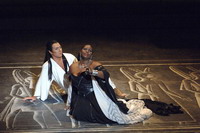Tenor Roberto Alagna rouses applause for his role in Puccini's "Madama Butterfly"
This time there were no boos.

To the contrary, the despicable Benjamin Franklin Pinkerton drew rousing applause at the Metropolitan Opera House as tenor Roberto Alagna poured out his soul in his first portrayal of that ugly American in Puccini's "Madama Butterfly."
The French-Sicilian singer was in complete control in the eye-catching production by Academy Award-winning director Anthony Minghella.
It was Alagna's second strong outing in the Met's young season. He won praise last month for Gounod's "Romeo et Juliette," his first performance here since he stormed out of La Scala opera house in December after being booed during Verdi's "Aida."
The biggest cheers Monday night went to American soprano Patricia Racette, making her Met role debut as Butterfly, Pinkerton's faithful but spurned wife.
With a girl-in-every-port mentality, the Navy lieutenant marries the 15-year-old geisha Cio-Cio-San while his ship is docked in the Japanese port of Nagasaki. She converts to Christianity, then is disowned by her relatives.
Only her maid Suzuki (American mezzo Maria Zifchak) stands by her. She helps Cio-Cio-San dress in her wedding kimono, and then the bride and groom sing their love duet as they are showered with multicolored pedals.
After Pinkerton's ship pulls out, Cio-Cio-San obsesses for her husband. She rejects a suitor and falls into poverty. Still, after three years of separation, she sings the opera's most famous aria, "Un bel di," awaiting that "one fine day" - when Pinkerton comes home to her and their son. Racette rose to the occasion, her voice filled with longing and tears of hope.
Pinkerton finally returns, but with his American wife and on a mission to take custody of his son (delightfully depicted by a life-size bunraku puppet controlled by three black-clad puppeteers). Cio-Cio-San decides her only way out is suicide. She stabs herself in the neck. Pinkerton finally feels the guilt and loss.
Alagna was a cool cad, singing smoothly and largely without effort. Filled with testosterone, he struts about in his Navy uniform, clinks glasses of whiskey with the American consul Sharpless as he celebrates his plot for conquest in the first act. Filled with remorse, he cries out Cio-Cio-San's name as she kills herself in the final scene.
Other standouts in the production included the heartfelt Zifchak and Italian baritone Luca Salsi, portraying Sharpless in a robust Met debut.
British conductor Mark Elder led the orchestra through Puccini's lush score filled with unforgettable melodies and Eastern and Western harmonies that blend into emotions transcending cultures.
Subscribe to Pravda.Ru Telegram channel, Facebook, RSS!


